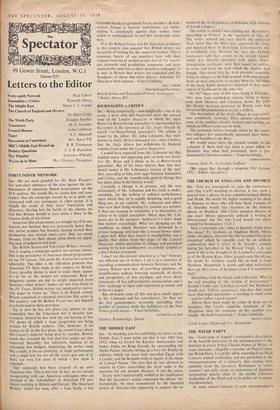JOURNALISTS v. CRITICS
SIR,—Being temporarily—and delightedly—out of the arena, 1 have only just happened upon the current issue of the London Magazine in which M r. Alan Brien ('ex-Beaverbrook journalist') is reprimanded for his review in the Spectator of The Angry Decade by myself ('ex-Beaverbrook journalist'). The rebuke is issued by the editor, Mr. John Lehmann, that well- known ex-Daily Mirror journalist (ex-, since I believe that the Daily Mirror has withdrawn its financial crutches from under the London Magazine).
I would have expected from Mr. Lehmann not that implied smear but approving pats on both our heads. For Mr. Brien and I chose to be ex-Beaverbrook journalists. But of far more interest than that inci- dental matter is Mr. Lehmann's version of the 'war' that, according to him, now rages between Journalists and Critics, and the 'considerable general change that has taken place in the literary world.'
Certainly a change is in process, and the wan melancholy of Mr. Lehmann and his circle is under- standable, for the iceberg of cultural exclusiveness upon which they sit is rapidly shrinking, and a good thing too, in my opinion. Mr. Lehmann and others who earn their living writing for journals are entitled, if they can manage to rationalise it to themselves, to refuse to be called journalists. (What does Mr. Leh- mann put in his passport—belIctrist?) I don't think that matters exceedingly. What are changing are the conditions in which literature was discussed in a private language and kept like a waxed flower under a glass bell. What does matter is intelligibility, not a quality that shines from the pages of the London Magazine, which specialises in oblique and garnished writing lit by low candlepower, as artfully tasteful as a chic Chelsea restaurant.
I don't see this present situation as a 'war' between two different sets of writers. I see it as a necessity of extending communications between literature and the society Britain now has, of providing guidance, of simplification without lowering standards, of clarity and perspective, of less Mystique and more direct statements, of less self-protective obscurantism and a freer exchange of ideas and experience in novels and in literary pages.
But obviously none of this can have much appeal to Mr. Lehmann and his contributors, for they arc the last gamekeepers, nervously patrolling their patches of preserve while the bulldozers of the New Towns groWl nearer.—Yours faithfully,






























 Previous page
Previous page